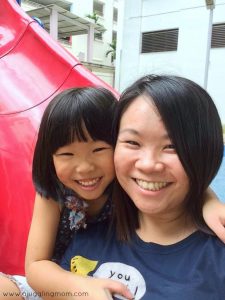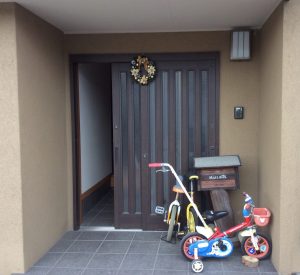
by Susan Koh | Feb 5, 2015 | 2015, Awareness, Caring, Childhood, Inspirational, Life Balance, Motherhood, Parenting, Responsibility, Singapore, Susan Koh, Working Mother, World Motherhood, Younger Children
 Since the start of the year, my daughter, Sophie, has been asking me to play with her as soon as we get home from work. I think it has to do with her anxiety about entering primary one in a year’s time (the age where formal studies start in Singapore). The teachers in her childcare have been telling her that she’ll have no time to play because she’ll have homework from school.
Since the start of the year, my daughter, Sophie, has been asking me to play with her as soon as we get home from work. I think it has to do with her anxiety about entering primary one in a year’s time (the age where formal studies start in Singapore). The teachers in her childcare have been telling her that she’ll have no time to play because she’ll have homework from school.
Some days, I’m glad to put down everything and play with her. But on other days, I’ll tell her to play on her own so that I can get down to the household chores. And on one of those days, when I was tired and frustrated after a full-day’s work, I lashed out at her for not being able to play independently when I have a hundred-and-one chores to see to, only to have her respond in tears.
When I questioned why she was so upset, she told me in between sobs that all children like to play and she really would like mummy to play with her.
A missed opportunity to play with your child, is a missed opportunity to enter their world and bond with them.
I can sense that my daughter’s request to play with her is really her way of saying:
“I want to spend time with you mummy”
“I want to do things with you daddy”
“I want you to be beside me”
While I may have my own agenda of what bonding with my daughter means, taking her to the playground, playing Lego, doing craft work, cooking pancakes together, her request is simply to put down what I’m doing and play with her.
And how can I allow her childhood to slip by without being a part of it? After all, we may not always have these moments:
- when our child still wants to play hide and seek with us
- our child asks for yet another bedtime story
- they hug us with all their might to show that they really really really love us
- they tickle us with the silliest things they say and infect us with their contagious laughter till our belly aches
- their little hands reach for ours looking for security in the middle of the night
- they plant a kiss on our cheeks and whisper, I love you mummy, for no reason at all; which melts us over and over again
The next time your child asks you to put down what you’re busy with so you can come play with her, don’t turn her down. A missed opportunity to play with your child, is a chance missed to enter her world and create special memories together.
What are some of the ways you take time out of your schedule to spend quality time playing with your child?
This is an original post to World Moms Blog from our contributor in Singapore, Susan Koh.
The images used in this post are attributed to the author.
Susan is from Singapore. As a full-time working mom, she's still learning to perfect the art of juggling between career and family while leading a happy and fulfilled life. She can't get by a day without coffee and swears she's no bimbo even though she likes pink and Hello Kitty. She's loves to travel and blogs passionately about parenting, marriage and relationship and leading a healthy life at A Juggling Mom.
More Posts

by Mirjam | Jan 12, 2015 | Childhood, Kids, Life Lesson, Motherhood, Netherlands, Uncategorized
 I had a little ritual with my son when he used to be little.
I had a little ritual with my son when he used to be little.
Sometimes when snuggling I would sit him down and tell him a little story.
I would tell him about the biggest most precious gift I ever received.
It has been ages since I told him that little story, but I still remember my son’s eyes turning big in anticipation as I got to the end of the story, revealing what the gift was.
“The gift was you,” I said.
And I proceeded to tell him how happy the gift made me and how loved he was.
No matter how many times I told him the same story, he never got tired of hearing it.
And I never got tired of telling him the same story.
I had promised myself very early on in life that if I ever had children, I would make sure they knew they were loved. As far as I was concerned, they would never have to deal with low self esteem or feel unwanted.
For most of my childhood, I spent time excusing myself for being me.
I tried to change myself, copy others, or suppress things that were typically me.
I apologized a lot. When you spend that much time being aware of what you are not supposed to be, you’re under a lot of pressure.
I used to bite my nails almost to the point of bleeding and I was shy and clumsy.
I broke things, I fell a lot, I bumped into things. It was a hard task, trying not to be me.
Today when I look at my middle child, who is almost like a copy-print of me, I laugh at my attempts.
That kid is so present, so alive, so wild, so loud, so emotional, so outspoken, so amazing.
There is no way to tone that down. And what a waste would it be to do so.
My kids have taught me that it is okay to be exactly who you are and that the flaws and the twitches are what makes a person unique.
My kids have helped me accept myself. I see myself when my daughter is persistent. I see myself when my oldest child gets emotional, I see myself when my kids do silly dances and I see myself when one of them nestles on the couch and disappears in a book.
It doesn’t bother me that my daughter feels too shy to speak around strangers, or that my son is difficult when he feels overwhelmed. Nor does it bother me that my daughter is chaotic and would forget to bring her own head to school, if it wasn’t attached to her body.
I see me.
Whenever I look at my kids, really look at them, my heart bursts with love.
I have always promised myself that whenever I had kids, I would give them the space to be themselves.
What I never expected was that through my love for them, I would learn to love and accept myself more.
And that is truly a gift.
What gift have your kids added to your life?
This is an original post to World Moms Blog by Mirjam of The Netherlands. Photo credit to the author.
Mirjam was born in warm, sunny Surinam, but raised in the cold, rainy Netherlands.
She´s the mom of three rambunctious beauties and has been married for over two decades to the love of her life.
Every day she´s challenged by combining the best and worst of two cultures at home.
She used to be an elementary school teacher but is now a stay at home Mom. In her free time she loves to pick up her photo camera.
Mirjam has had a life long battle with depression and is not afraid to talk about it.
She enjoys being a blogger, an amateur photographer, and loves being creative in many ways.
But most of all she loves live and laughter, even though sometimes she is the joke herself.
You can find Mirjam (sporadically) at her blog Apples and Roses where she blogs about her battle with depression and finding beauty in the simplest of things. You can also find Mirjam on Twitter and Instagram.
More Posts - Website
Follow Me:



by Melanie Oda (Japan) | Jan 8, 2015 | 2014, Awareness, Child Care, Childhood, Culture, Domesticity, Education, Expat Life, Eye on Culture, Family, Feminism, Grandparent, Home, Husband, International, Japan, Life, Life Lesson, Living Abroad, Marriage, Me-Time, Motherhood, Multicultural, Parent Care, Parenting, Priorities, Relationships, Responsibility, School, Social Equality, Womanhood, Women's Rights, World Motherhood, Younger Children
 Gender equality has been in the news quite a bit in Japan recently, sort of, and some things have happened closer to home that have me thinking.
Gender equality has been in the news quite a bit in Japan recently, sort of, and some things have happened closer to home that have me thinking.
It started when a (female) Tokyo assembly member was heckled in a sexist way. Then Prime Minister Abe introduced some new policies to let women “shine.” (He needs to get them doing something for the economy.) He even appointed several women to cabinet posts, for about five minutes, until they were slapped back down into their places over minor scandals.
In Japan, people are talking more about issues women face but no one seems to be doing much about them.
(Lest I forget: strangely enough, the declining birth rate is treated as a “women’s issue.” I seem to remember my husband being involved, too.)
I never considered myself a feminist growing up. Some members of the evangelical, conservative community I grew up in doubtless felt “feminist” was a new version of the “F-word.”
OK, so I went to a high school with more sports options for boys than girls. And yes, girls were encouraged to take chorus and home economics instead of woodworking or mechanics. So maybe I heard men from my community refer to grown women as “broads” or “gals.” There also were some restrictions at church regarding women’s and men’s roles. But I never felt that possessing certain types of baby-making parts limited my potential.
Then I moved to Japan, where gender roles are more firmly entrenched and my way of thinking slowly changed.
As I get older, and because I am a mother, I find that I am limited in ways that I couldn’t have foreseen as a young girl.
Some people may find life here in Japan freeing. If you aspire to be a homemaker a la Martha Stewart, then your life’s work would be very much respected and appreciated here. My husband wouldn’t bat an eyelid if he came home to a messy house because I’d spent the day at a preschool mothers’ lunch. He knows that is part of the job (on the other hand, it would never occur to him to pick up the mess himself.)
If, as a woman, you have other aspirations, Japanese culture seems designed to work against you. The glass ceiling is very much in tact. On the news here you do hear issues like lack of childcare and “maternity harassment” being addressed. But what gets talked about less often is that to many women, including myself, it feels as if there’s a glass door as well.
It’s my front door.
Before a woman can even think about what is facing her out in the world, she needs to address the forces that are keeping her at home. Some of these are practical, some are logistical, some are cultural and perhaps peculiar to Japan and it’s work culture.
For me, it starts with my husband: He leaves home at 7am every morning, but I have no idea what time he will be back. Sometimes it’s 7pm. Sometimes it’s midnight. He may be in the office that day, or he may suddenly be sent to another prefecture. He’s made international trips on 12 hours notice. I cannot depend on him being home at a designated time, by no fault of his own. The idea of him taking time off with a sick child is preposterous in the extreme.
I have been lucky enough to have two job offers recently, both of which would be more or less during school hours, but neither is nearby. If a child were to get sick and need picking up, or if god-forbid there was a natural disaster (which is always in the back of your mind if you are a mother in Japan,) then my husband would be closer. I mentioned that, and he completely shot me down. Not just the idea of him picking up the kids in case of an emergency, but the idea of a job anywhere outside of cycling distance from the school.
We live in a residential neighborhood. I patch together some part-time work here and there, but it’s not like there are loads of professional opportunities in a two kilometer radius.
I suddenly felt very limited, penned in, in a way I haven’t felt before. The glass door was slamming in my face.
I don’t think I’m alone in this conundrum. Go to almost any supermarket in a residential area during the day, and you will see women in their prime working years manning the register. Many of these women have university degrees. Many have licenses and qualifications to be doing other kinds of work, but they want to stay close to home. They also need salaries to stay under $10,000 year or face a peculiar Japanese tax code and insurance system that penalizes families where both partners have incomes over that amount.
Then there are my kids: Like 2/3 of Japanese women with children under 6, I stayed home when they were small. They now completely depend on me for everything. It seems to have never entered their minds that someone else could give them a bath or help them find their missing socks, mostly because no one else has ever done anything for them. Especially when they are sick, they want only me. It was very hard when my daughter was in the hospital, both children wanting to be with me and emphatic that no one else would do.
But now my youngest is in elementary school, and I would like to just be doing more of something….else, but for me to plunge into the workforce would be a huge adjustment for my children. Is it worth the stress? Can we survive what is sure to be a painful adjustment period?
Maybe if I had more family support, it would feel less impossible but as it is, it seems like everyone is against me.
Which brings me to the final characters in this comedy, my in-laws: They say they’ll watch the kids, then they change their minds. Or something better comes up. From their point of view, this house and these people are completely my responsibility. Anything they do is extra credit.
To be honest, we’re getting to the point where my in-laws need my help more than I need theirs.
They aren’t shy about letting me know my place.
One day not too long ago, my son was playing at the park with his friends. It was getting close to homework time, so I called him and told him to come home. He said he was playing with Jiji (which is an endearing term for grandfather used in our region of Japan,) and could he play for a bit longer? Since he was out with an adult, I said okay.
The next day, I got a verbal whipping from my father-in-law over the phone, accusing me of being irresponsible, a bad mother. It took me a few minutes to understand why he was saying this, but when I got to the bottom of it, I realized my son had lied to me. He was playing with his friends when Jiji walked by and told him to go home. My son told him I wasn’t at home and said he couldn’t come back until I did. (I must have called right at this point.) “How dare you not be home in the afternoon?” said Jiji.
Putting aside that none of this nonsense was true, so what if I wasn’t home in the afternoon? Of course I wouldn’t have left the kids to wander the neighborhood like stray dogs, but why was my not physically being inside my house such an issue to him? His assumption that it was my duty to be always available to everyone took me by surprise.
I could almost hear the glass door slamming again.
There are also other barriers for women in Japan—an over active PTA for one, and a myriad of community responsibilities attended to exclusively by women for another. I imagine most women in the world encounter both the “glass door” and the “glass ceiling” in some form or another, but in Japan only one of these factors is seems to be getting much attention. Building new daycare facilities isn’t enough; the government stating goals to increase women’s participation in the workforce isn’t enough. Until we do something about that glass door, nothing will change for one of the best educated, least utilized group of women in the world.
Do you feel you are fulfilling your potential, both at work and at home? What’s the situation like in your country?
This is an original post for World Moms Blog from our writer and mother of two in Japan, Melanie Oda.
If you ask Melanie Oda where she is from, she will answer "Georgia." (Unless you ask her in Japanese. Then she will say "America.") It sounds nice, and it's a one-word answer, which is what most people expect. The truth is more complex. She moved around several small towns in the south growing up. Such is life when your father is a Southern Baptist preacher of the hellfire and brimstone variety.
She came to Japan in 2000 as an assistant language teacher, and has never managed to leave. She currently resides in Yokohama, on the outskirts of Tokyo (but please don't tell anyone she described it that way! Citizens of Yokohama have a lot of pride). No one is more surprised to find her here, married to a Japanese man and with two bilingual children (aged four and seven), than herself. And possibly her mother.
You can read more about her misadventures in Asia on her blog, HamakkoMommy.
More Posts

by Susie Newday (Israel) | Dec 21, 2014 | 2014, Childhood, Friendship, Israel, Life, Moving, Susie Newday

They sit there.
A mixed pile of emotions, long lost puzzle pieces of my youth that have surfaced with a surreal reminder of joy and heartache. A collection of recollections of the beauty and naivete of my tormented, confused yet vibrant teen years.
Pieces of papers and assorted mementos, all too precious for me to have thrown away, yet not important enough for me to taken them when I started my married life and moved away.
Yet here they are. Twenty-five years later they have made the journey overseas and have arrived in my home. When my parents cleaned out my childhood home before moving away, I once again couldn’t bear for these pieces of my youth to be thrown out without a second glance. Who knows what treasures might be hidden in their midst.
Now I’m overwhelmed. By the amount and variety of written correspondence I saved. There are letters from my first love at the age of 14, so beautiful, sincere and full of promise. There are tender letters from my husband back in the years before email and text messages. There are stacks of heartfelt letters from people whom I don’t remember, people I’m sure I thought I would never forget. There are letters from people whom I remember but am surprised to find out how close I used to be with them. There are blasts from the past like my old college roommate who by chance recently friended me on Facebook. There are cards and yearbooks full of short wishes and goodbyes.
Some comments make my heart go thump, while others like “ Don’t beat up too many boys.”, remind me of parts of my personality that I wish I could forget. There are words of friendship, caring, support and encouragement that warm the cockles of my heart. And I wonder yet again why certain people stayed in my life and others drifted away.
That’s the hard part of nostalgia, trying to make sense of things, trying to understand how you gently got rerouted to a path so wonderful yet so different than the one you had envisioned.
The empty seductive promises of the past are dangerous, for they’re not real in the present moment in time. They were real in a different reality when you were a different person. Yet even so, it’s hard to read your youth without wondering about alternate endings to your life story. The past is an enticing illusion, a strong magnet drawing you in and distorting the present.
Do you think there is any way to embrace the joy and wonder of what was without leaving both the past and the present a little less whole?
Susie Newday is a happily-married American-born Israeli mother of five. She is an oncology nurse, blogger and avid amateur photographer.
Most importantly, Susie is a happily married mother of five amazing kids from age 8-24 and soon to be a mother in law. (Which also makes her a chef, maid, tutor, chauffeur, launderer...) Susie's blog, New Day, New Lesson, is her attempt to help others and herself view the lessons life hands all of us in a positive light. She will also be the first to admit that blogging is great free therapy as well. Susie's hope for the world? Increasing kindness, tolerance and love.
You can also follow her Facebook page New Day, New Lesson where she posts her unique photos with quotes as well as gift ideas.
More Posts - Website
Follow Me:






by Tara Bergman (USA) | Dec 5, 2014 | 2014, Childhood, Family, Home, Me-Time, Siblings, Tara B., Travel, USA, Vacationing, World Motherhood
 Recently, I had the opportunity to travel to my hometown to attend my high school reunion. I was excited about the trip for several reasons. I rarely travel without my children, and this visit was just for me. I would be able to see my parents, my sisters, and childhood friends with one night out on the town. (more…)
Recently, I had the opportunity to travel to my hometown to attend my high school reunion. I was excited about the trip for several reasons. I rarely travel without my children, and this visit was just for me. I would be able to see my parents, my sisters, and childhood friends with one night out on the town. (more…)
Tara is a native Pennsylvanian who moved to the Seattle area in 1998 (sight unseen) with her husband to start their grand life adventure together. Despite the difficult fact that their family is a plane ride away, the couple fell in love with the Pacific Northwest and have put down roots. They have 2 super charged little boys and recently moved out of the Seattle suburbs further east into the country, trading in a Starbucks on every corner for coyotes in the backyard. Tara loves the outdoors (hiking, biking, camping). And, when her family isn't out in nature, they are hunkered down at home with friends, sharing a meal, playing games, and generally having fun. She loves being a stay-at-home mom and sharing her experiences on World Moms Network!
More Posts

by Kyla P'an (Portugal) | Nov 21, 2014 | 2014, Adolescence, Awareness, Childhood, Girl Child, Girls, Kids, Life, Life Lesson, Media, Milestones, Motherhood, Older Children, Parenting, Puberty, Teenagers, World Motherhood, Youth

The Wicked Witch of the West
Eight years ago I had my first child, a daughter. Like most new parents, I got all sorts of advice and did a great deal of information gathering; particularly on those uncharted, early stages of infancy and babyhood.
I knew it was possible my child would have colic, GERD, and rashes. I had heard about the “terrible twos” and the “trying threes.” I was fortified for long days and short nights, especially during the early years. And I knew having a child home to entertain and educate for five years would be a whole different challenge from my professional life.
But, I thought I was ready because I knew—at the end of a long, sometimes dark, tunnel—there would be kindergarten, followed by the blissful and innocent days of elementary school to put me back on track. I anticipated that from age 5-11, life would be pretty seamless. Five years of struggle followed by at least six of predictability before the challenges of the teenage years moved in.
So when our daughter entered kindergarten three years ago, my husband and I settled in for the “predictable” parenting years we were expecting.
Sadly—and far too soon—those years are coming to a close…
This past summer, we got glimpses of something we had heard about but weren’t prepared for just yet: moodiness, sassy attitude, changes in speaking style, exploration of identity, greater awareness of appearance and increased self-consciousness.
Now that 3rd-grade is in full-swing, those glimpses are becoming the norm. It’s fairly clear that we are entering a new stage of parenting: we’re entering the TWEENS.
“Tween” is a term we use here in the US to describe the pre-teen stage of life. It’s in-between being a sweet, young kid, who’s dependent on parents and family for every aspect of life, and puberty, when a child morphs into a sassy, experimenting, independent teenager, stomping off toward adulthood.
The Tweens is a stage of life—I think populated almost exclusively by girls—when kids try to propel themselves prematurely into their next growth phase. They test out language they pick up from older kids, through pop-music and from movies and television. They mimic styles they see in the media. They use vernacular such as “like” and “whatever” and “no way!” They gravitate almost exclusively to their own gender groups.
And despite even the best attempts to shield children from pop culture and the negative influences present on TV, they still somehow find their fix at school.
The tweens are a funny, little limbo-land.
Take our daughter for example: She’s still afraid of the dark (in fact, she’s fairly convinced the Wicked Witch from the Wizard of Oz is living in her closet); her favorite Disney character is Sofia the First; she loves kittens and rainbows, unicorns and stuffed animals. But recently, she also has discovered Disney’s High School Musical, and when we go to our pediatrician’s office, she pours over the book, It’s Perfectly Normal, (she has a lot of questions about both).
These days, she prone to emotional outbursts, demanding “alone” time and spontaneous moments of being shy. Aren’t these teenager behaviors?
Tonight, while my five-year-old was in a martial arts class, my daughter and I sat in the car having a chat. She said she was sad because she felt frustrated and sort of out of control. I found myself explaining puberty to her and talking about hormones and endorphins and lots of other changes in our bodies that made us feel confused and out of sorts…Uh, did I mention she’s only 8?
According to the American Academy of Pediatrics, the onset of puberty in girls now happens as young as 7! OK, so none of my early parenthood prep or information gathering or family planning ever involved needing to have these conversations so soon. Afterall, my youngest just started kindergarten. By my accounts, I had just come out of the trenches. I’m not battle ready. I don’t have my armor on. This is going to be a massacre!
But this is where we are these days…the in-beTWEENS. Wish us luck.
Have you experienced these sorts of changes in your own child(ren)? If so, at what age? Any advice for getting through to the other side?
This is an original post to World Moms Blog from our managing editor and mother of two (one of whom is entering her tweens), Kyla P’an.
The image used in this post is credited to Karen. It holds a Flickr Creative Commons attribution license.
Kyla was born in suburban Philadelphia but spent most of her time growing up in New England. She took her first big, solo-trip at age 14, when she traveled to visit a friend on a small Greek island. Since then, travels have included: three months on the European rails, three years studying and working in Japan, and nine months taking the slow route back from Japan to the US when she was done. In addition to her work as Managing Editor of World Moms Network, Kyla is a freelance writer, copy editor, recovering triathlete and occasional blogger. Until recently, she and her husband resided outside of Boston, Massachusetts, where they were raising two spunky kids, two frisky cats, a snail, a fish and a snake. They now live outside of Lisbon, Portugal with two spunky teens and three frisky cats. You can read more about Kyla’s outlook on the world and parenting on her personal blogs, Growing Muses And Muses Where We Go
More Posts - Website
Follow Me:


 Since the start of the year, my daughter, Sophie, has been asking me to play with her as soon as we get home from work. I think it has to do with her anxiety about entering primary one in a year’s time (the age where formal studies start in Singapore). The teachers in her childcare have been telling her that she’ll have no time to play because she’ll have homework from school.
Since the start of the year, my daughter, Sophie, has been asking me to play with her as soon as we get home from work. I think it has to do with her anxiety about entering primary one in a year’s time (the age where formal studies start in Singapore). The teachers in her childcare have been telling her that she’ll have no time to play because she’ll have homework from school.













 Recently, I had the opportunity to travel to my hometown to attend my high school reunion. I was excited about the trip for several reasons. I rarely travel without my children, and this visit was just for me. I would be able to see my parents, my sisters, and childhood friends with one night out on the town.
Recently, I had the opportunity to travel to my hometown to attend my high school reunion. I was excited about the trip for several reasons. I rarely travel without my children, and this visit was just for me. I would be able to see my parents, my sisters, and childhood friends with one night out on the town. 




